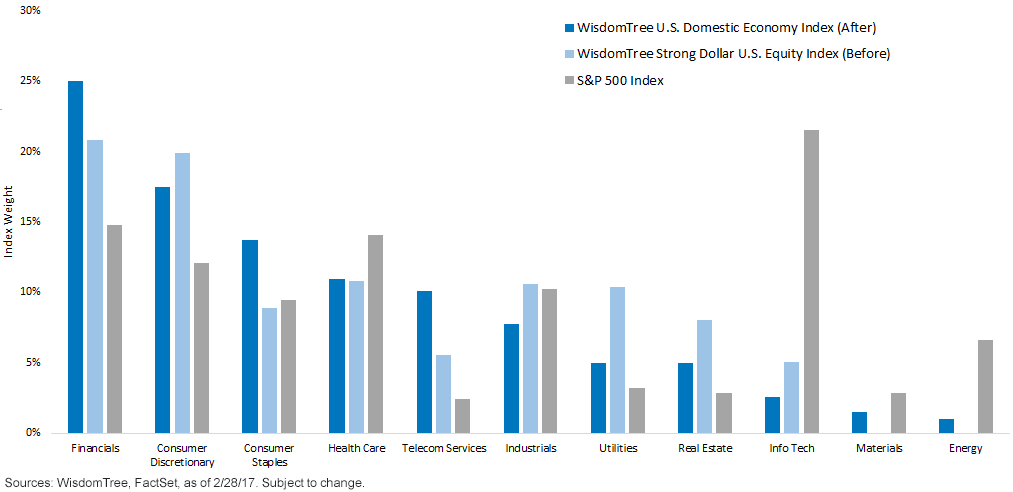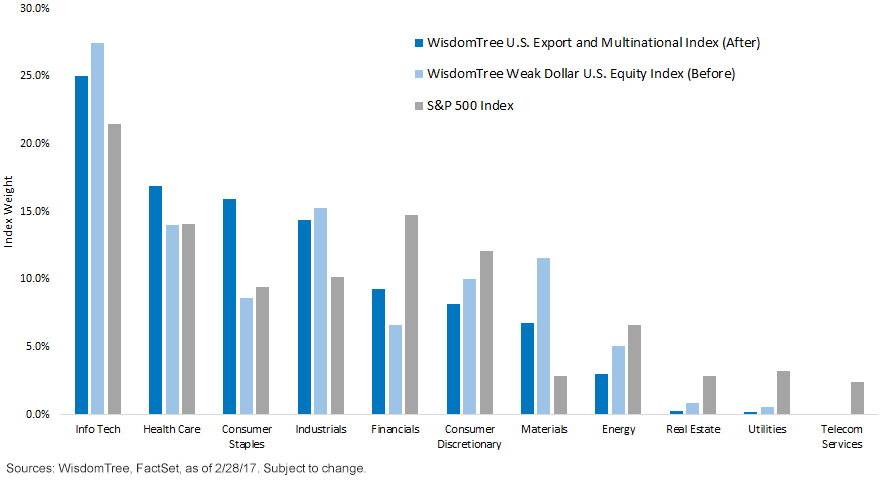Two Indexes to Monitor Trump Trades


WisdomTree has enhanced two Indexes to allow investors to track important investment themes tied to the policies of the new administration. For a president who wants to “buy American” and “rebuild America,” there might be an opportunity for companies that generate a majority of their revenue from within the U.S. to see sales and earnings increase. Policy focused on lowering taxes could also help companies that generate a majority of their revenue in the U.S. because they typically have higher effective tax rates than companies with profits overseas at lower tax rates.
Although companies that generate a majority of their revenue from outside the U.S. may not benefit as much from a domestic tax cut, they could potentially benefit from a repatriation tax reform or holiday, allowing them to bring cash back from abroad at a lower tax rate. With the potential for excess cash on hand, these companies may be in a good position to increase their dividends or buy back their stock, both positive long-term impacts on equity performance.
The WisdomTree U.S. Domestic Economy Index
Previously named the WisdomTree Strong Dollar U.S. Equity Index, it measured the performance of U.S.-based companies that derive more than 80% of their revenue from within United States. The Index was designed with a goal of minimizing exposure to companies with significant revenue from exports that are vulnerable to a strengthening U.S. dollar. While the weighting process was complex, the most important factor was stock selection and the screen for revenue from within the U.S.
Constituents in the new Index have the same revenue screens but are now weighted based on a modified Earnings Stream. WisdomTree created a set of earnings-weighted Indexes more than a decade ago, and we believe strongly in the long-term benefits of tilting more weight toward stocks with lower price-to-earnings (P/E) ratios. We are very proud of the live performance results of those Indexes. At its core, the WisdomTree U.S. Domestic Economy Index uses this same earnings-weighted process, but then scales earnings based on the percentage of revenue the company generates in the U.S.1
- Over-Weight to Financials and Consumer Discretionary: The new Index remains over-weight to Financials and Consumer Discretionary compared to the S&P 500 Index and increased its over-weight to Telecommunication Services. To manage risk from outsized exposure to the Real Estate and Utilities sectors, the new index methodology caps both of these sectors at 5%.
- Under-Weight to Information Technology: The most noticeable under-weight is Information Technology. Two of the largest stocks in this sector, Apple and Alphabet, both generate more than 50% of their revenue from outside the U.S. Under-weights also remain in the Energy and Materials sectors, but less than the previous Index.
WisdomTree U.S. Domestic Economy Index Sector Differences

The WisdomTree U.S. Export and Multinational Index
Previously named the WisdomTree Weak Dollar U.S. Equity Index, it measured the performance of U.S.-based companies that derive less than 60% of their revenue from the United States. The Index was designed with a goal of maximizing exposure to companies with significant revenue from exports that may benefit from a weakening U.S. dollar.
Again, this new U.S. Export and Multinational Index derives weight from the earnings index that is scaled by the percentage of revenue the company generates outside the U.S.
- Over-Weight to Information Technology and Industrials: The new index is over-weight Technology, Consumer Staples, Industrials and Materials compared to the S&P 500 Index.
- Under-Weight to Real Estate, Telecom and Utilities: The most noticeable under-weights are Real Estate, Telecom and Utilities. All of these sectors are primarily domestically focused, so they generate only a small percentage of their revenue from outside the U.S.
WisdomTree U.S. Export and Multinational Index Sector Differences

Fundamental Differences
 For definitions of terms in the chart, visit our glossary.
For definitions of terms in the chart, visit our glossary.
- Distinct Revenue Differences: With no overlap between the U.S. Domestic Economy Index and the U.S. Export and Multinational Index, each one provided a distinct exposure to companies that generate a majority of their revenue either in the U.S. or outside the U.S.
- Lower P/E Ratios for WisdomTree Indexes: Both WisdomTree Indexes have a lower trailing and estimated P/E ratio than the S&P 500. This is a result of the modified earnings-weighted approach and an important element given the valuation risk in the U.S. equity market.
- Exports and Multinationals Exhibit Higher Return on Equity: Since exports and multinationals typically have lower effective tax rates, it makes sense that they had a higher return on equity. Also, the WisdomTree Index’s largest sector weight was the Information Technology sector, which usually exhibits high profitability measures.
Conclusion
As WisdomTree thinks about the evolution of factor index strategies, where companies derive their revenue has the potential to be an important factor driving performance. Exchange rates and tax policies can provide tailwinds or headwinds to either basket—with the more domestic economy basket being one of the focal points in a strong dollar environment as well as in a scenario where domestic tax rates are being cut. In an upcoming blog post, our team will evaluate the tax impact on these and other WisdomTree Indexes.
1Index weight is a function of a company’s earnings multiplied by the percentage of sales generated in the U.S.


